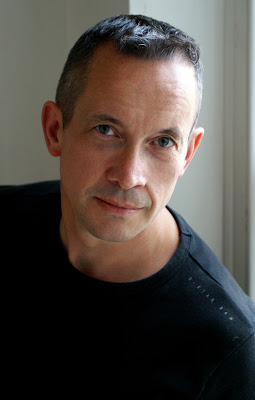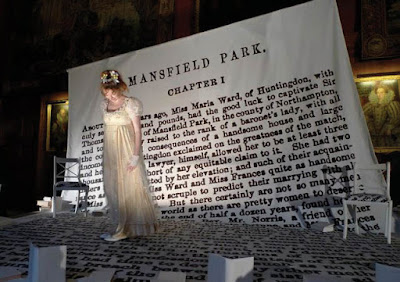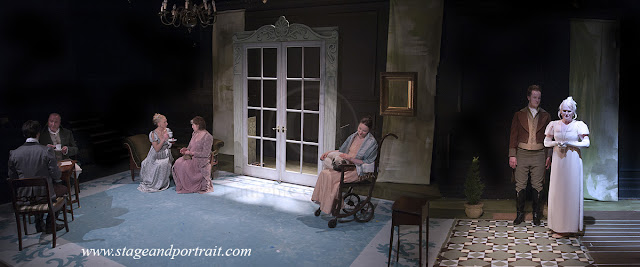Jonathan Dove talks about writing operas, and his new version of Mansfield Park.
 |
| Set design by Dick Bird for Martin Lloyd Evans production of Jonathan Dove's Mansfield Park at The Grange Festival |
Mansfield Park provoked music in a way that no other Jane Austen novels did
 |
| Jonathan Dove |
Separate from this, he had friends working with Pavilion Opera who performed operas in stately homes with piano accompaniment. The two ideas 'sort of coalesced'; an opera based on Mansfield Park put on to piano accompaniment in a country house, with a plot set in a country house which even has a play being put on.
Jonathan rather liked the idea of writing for piano accompaniment and around ten singers (the maximum number he had been allowed when commissioned to write Flight for Glyndebourne). He imagined the opera as simply being performed in the round in a country house, and never thought about performance in a proscenium arch theatre.
In 1998, independent of this but linked, Jonathan's long time librettist collaborator Alasdair Middleton was wanting to make a theatre piece out of one of Jane Austen's juvenilia, The Beautiful Cassandra, a short, delicious little piece written when Austen was 12. They created a melodrama out of it (it was recently performed at the Orlando Festival in the Netherlands), and Alasdair told Jonathan that Austen used to get up early to practise the piano. So the idea of Austen as a pianist, young ladies performing the piano as an accomplishment, rather found its way into Mansfield Park too.
The idea for the opera, but no-one was asking for it
 |
| Jonathan Dove: Mansfield Park - Heritage Opera (2011) |
Anthony Whitworth Jones (then at Garsington Opera) came to hear it and commented that the work would fit a 500-600 seat theatre but would need more colours in the accompaniment. Though, as a rather wordy opera, it did not seem a good fit with too big a theatre. The Royal Academy of Music performed the opera in 2012 with the piano on stage and the piece certainly seemed big enough to fill the space. But Jonathan accepts that companies might have conceptions of his works which never occurred to him when writing them, for example Tobias and the Angel was conceived as a church opera but in 2006 the Young Vic successfully used it to re-open their theatre.
For Mansfield Park, Jonathan feels that Alasdair Middleton's dramatisation of the book is quite brilliant, though inevitably it has radical elements. There an no scenes in Portsmouth, Tom (the oldest Bertram son) does not appear, and neither does Fanny's brother William. The orchestration of Mansfield Park was commissioned by The Grange Festival, and Jonathan used an ensemble of 13 instruments including piano (almost identical to Britten's The Rape of Lucretia) so that there are elements of a piano concerto to the accompaniment. Jonathan hopes it will be just as easy to achieve a good balance with the singers, as the orchestra is in the pit.
In fact, Britten was considering an operatic version of Mansfield Park as a follow up to The Rape of Lucretia. Jonathan did not know about the Britten connection when he first imagined the opera, but when working with Colin Graham (who had worked with Britten), Graham talked about it. Evidently there was rather more than a scenario, and Ronald Duncan drafted the libretto to Act One, though Britten wrote no music.
Frustrated by film and television adaptations of Mansfield Park
 |
| Set design by Dick Bird for Martin Lloyd Evans production of Jonathan Dove's Mansfield Park at The Grange Festival |
Another aspect of adaptations of Jane Austen was the challenge of making the manners formal enough, and Jonathan feels that too often the manners are too modern. So the music gives a sense of restraint, with Jonathan restricting the sound palate. He has tried to include nothing that would not have occurred post-1815. But he points out that it is not a work of scholarship, nor does he pastiche the music of the time, instead the individual sounds (the chords etc) are ones which Jane Austen herself could recognise but Jonathan's musical grammar is different. But it begins and ends with a chord of C major.
Another layer of formality is that in the libretto, the characters announce each chapter which also helps to compress the work as Jonathan and Alasdair were able to just use the most important scenes.
He found many instrumental ideas implicit in the piece
Jonathan's normal method of composing an opera is to write the vocal score first (as this is the score which needs delivering for rehearsals), and to orchestrate later. But he thinks about the orchestration as he writes, so he has thought about the orchestra even thought the parts have not been written out. For Mansfield Park it was entirely different, he was orchestrating a piano part which had never been thought of in orchestral terms. In fact, he found many instrumental ideas implicit in the piece, though he was also able to do things not possible in the piano (such as have off-stage instruments during the ball scene). The instruments also bring colour and intensity, so that emotions present in the score have more importance.
Normally when writing opera Jonathan expects to find the characters each have their own instrumental colour or mode (he tends to write in modes), and the working out of the drama is in the working out of the contrasts between this different kinds of music. But Mansfield Park is not like that, it is more Mozartian in that each scene is like a self-contained number, and there is only one recurring motif, which is connected to Fanny. Jonathan feels that it is a special piece in his output, but it could never be described as modernist and he sees it more as an homage to neo-classicism in a similar vein to Stravinsky's The Rake's Progress.
A significant number of operas though not all of them are called so
 |
| Jonathan Dove: Mansfield Park - Indianapolis Opera (2016) (Photo Dennis Ryan Kelley Jr.) |
Jonathan's varied and flexible attitude to the operatic form, whether it be the forces involved or the style of the piece, arises partly because his formative operatic experiences were writing community operas for Glyndebourne (the biggest used 600 performers) and the Hackney Empire. And his recent work The Monster in the Maze continues this, as it uses a very big cast (300 when it as performed in Aix-en-Provence) includes adult, youth and children's choruses.
He was accompanying James Bowman, and getting paid for it!
As a teenager Jonathan loved the theatre, and loved playing in the London Schools Symphony Orchestra, as well as enjoying singing in the school choir. After University, to earn a living, he became a repetiteur in opera (getting his first job thanks to Jeremy Sams). This was the beginning of his operatic life; he realised that all the things that he was keen one could be found in this one medium. He was accompanying James Bowman, and getting paid for it! A door had opened.
He was playing for rehearsals of The Tales of Hoffmann for Birmingham Opera when the planned orchestral reduction failed to appear and lots of people were involved in creating it at the last minute. Jonathan then did the orchestral reductions for the subsequent operas La Cenerentola, La Boheme, The Magic Flute, The Cunning Little Vixen and, most famously, Wagner's Ring Cycle (in 1990) for 18 instruments. This was his apprenticeship, thinking about scores from the composer's point view; could the same effect be achieved with smaller forces.
He did not feel that what he was doing was respectable
 |
| Set design by Dick Bird for Martin Lloyd Evans production of Jonathan Dove's Mansfield Park at The Grange Festival |
The first pieces where he found his own voice were dance pieces. Partly this was because dance has its own environment so he felt emboldened to do what he wanted as people would be looking at the dancers. So this was when he heard the music and it felt exactly right. He adds that though the pieces would never have been done by SPNM (the Society of Promotion for New Music which merged with three other networks in 2008 to become Sound and Music), there was no shortage of earnest new music.
Growing up, writing opera did not occur to him because in new opera at the time, it was not possible to write music which was direct, fun, had catchy tunes, and used an orchestra, where you could hum the tunes afterwards.
A particular way of looking at the world
At one point in our discussions we talk about the term opera. This was partly because I hesitated to use the word for some of Jonathan's pieces, but he sees the operatic genre as a wide one. He has grown up with a particular affection for trained singers and acoustic instruments, and though he has worked in other areas, these are what he is most comfortable with. In terms of style, Jonathan uses and interesting analogy. If you have a continent of musical comedy whose Northernmost shore is Sondheim, and a continent of opera whose Southernmost shore is Britten, the Jonathan is in the sea between them!
 |
| Jonathan Dove: Mansfield Park - Hampstead Garden Opera (2013) |
Sometimes he has an idea for an opera which no one is interested in, but the ideas do not go away and some have remained on the back burner. To bring an opera into the world takes the convergence of a number of things. Many years ago, he and Alasdair Middleton were travelling round Italy and visited the Parco di Pinocchio in Collodi, giving them the idea of Pinocchio as an opera, which would eventually become The Adventures of Pinocchio. He offered the idea to Opera North and they decided to commission it.
Jonathan's operas tend to have a variety of types of genesis
 |
| Jonathan Dove: Mansfield Park - Royal Academy of Music (2012) (Photo Hana Zushi) |
Flight has a special place in Jonathan's affections; a high profile commission from Glyndebourne, it was an amazing platform so early in his composing experience and for Jonathan is is surprising how many subsequent productions there have been, how many people have seen it. The Monster in The Maze is his most translated piece, and whilst working on them his community operas felt the most worthwhile. His first TV opera When she died (about Diana, Princess of Wales), had by far the biggest audience and was like having something performed at the London Coliseum every night for three years. The Enchanted Pig is one of his most performed works, the original production had 151 performances.
Mansfield Park at The Grange Festival
Mansfield Park is being performed at The Grange Festival by a team which has history with Jonathan's operas, conductor David Parry and director Martin Lloyd Evans, and Jonathan loves both of their work. During his repetiteur days Jonathan played for a lot of productions which David Parry conducted, so David Parry conducted the premieres of Flight, Tobias and the Angel and Pinocchio. Jonathan comments that there is a photo somewhere of himself and Parry playing duets at Batignano, and he feels David Parry understands his music. Martin Lloyd Evans has directed Flight for British Youth Opera, Pinocchio and The Little Green Swallow at the Guildhall School of Music and Drama, and designer Dick Bird was responsible for Pinocchio and The Little Green Swallow at the Guildhall.
 |
| The Grange, Northington (Photo Joe Low) |











No comments:
Post a Comment